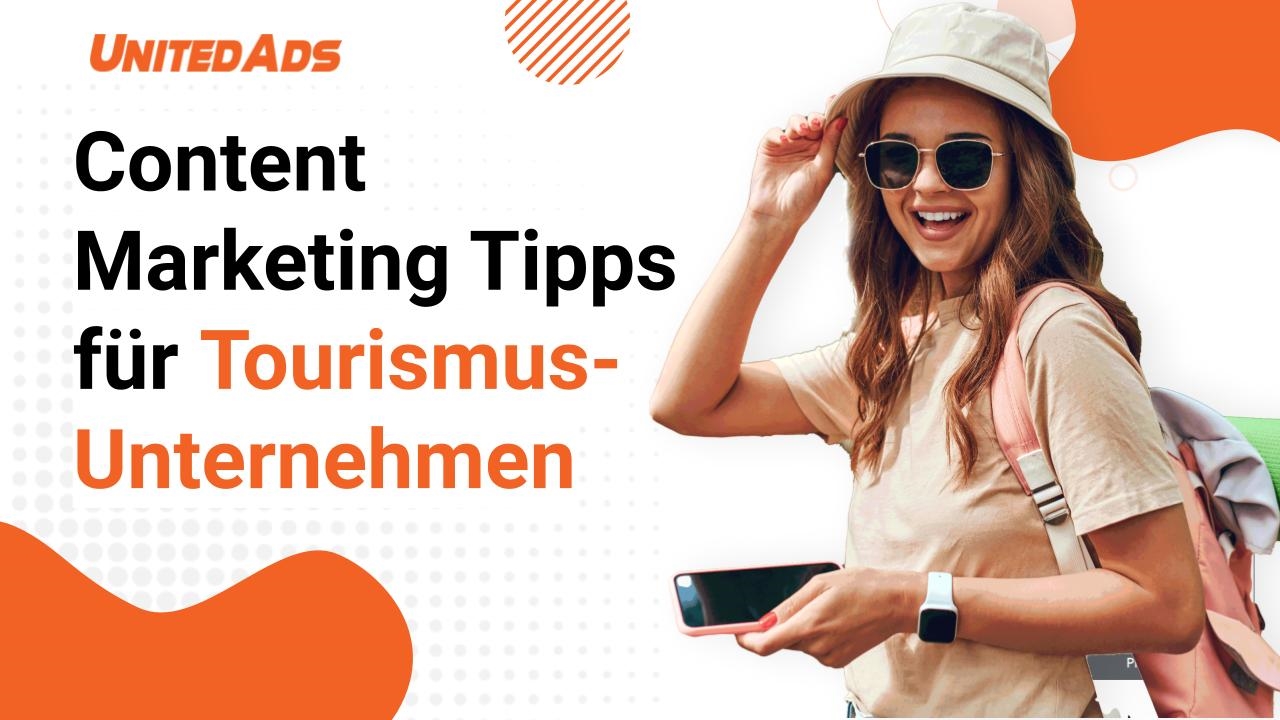Online marketing in tourism is undoubtedly one of the most diverse and therefore most demanding marketing disciplines.
Content marketing is one of the most important online marketing measures in tourism. With texts, images and videos, you can reach potential guests in the most diverse ways and on various platforms and inspire them for your hotel or destination.
In this article, we will show you what you should pay special attention to when it comes to content marketing in tourism and how you are guaranteed to attract more guests.
Tip 1: Evoke emotions in guests
Especially in the tourism sector, emotions play a major role. For many, a vacation is a long-awaited reward after months of hard work. Therefore, the decision for a vacation spot is often also driven by the emotions associated with a destination.
Someone looking to book a relaxing vacation has different destinations in mind than someone looking for an exciting adventure vacation. With emotionally charged content marketing, you can thus help represent the right emotions with your hotel or destination.

Impressive images and cinematic videos are particularly suitable for evoking the desired emotions and conveying them. While you’re at it, show guests experiencing the very emotions you want to evoke.
You want to present your hotel as a wellness oasis? Then you should also show guests relaxing in pools and saunas or just enjoying a massage. The advantage of pictures and videos is not only that they wonderfully transport emotions. But also that they are easy to consume.
Tip 2: Put yourself in the shoes of your target group
In order to evoke the aforementioned emotions in potential guests and create the need for them to book exactly with you, you need to know your target group.
Find out the right approach, what your guests’ needs are and how to address them properly. In addition, you should find out through which channels you can best reach your target group. The best way to do this is to ask guests who visit you or have visited you before.
You should ask your guests the following questions:
Through which channel did you become aware of us?
How do you find out about a destination or hotel?
What made them choose our destination or hotel?
What do you particularly like about our destination or hotel?
What information did you miss when booking a vacation?
With the insights from the guest survey, you can target your content even better. Afterwards, you can use it to reach even more potential guests and gain even more ideas for your content marketing.
Tip 3: Create added value for your guests
In addition to content that draws attention to your destination or hotel and describes its benefits, you should also focus on content that offers potential added value.
Let guests know what or what not they need when they visit. Or describe how to get to your hotel and what additional services guests can book with you.
If you offer your guests added value with your content, it is just as much added value as if you offer additional services in your hotel. Surprise your guests with your content as well as your services and exceed their expectations.
Tip 4: Communicate your messages succinctly
Of course, you should add value to your guests with your marketing. But that doesn’t always mean that your content has to be extremely long. The attention span of us humans is getting shorter and shorter, which is why it is so important to adapt the content to it.
In some places, short-form content is much more effective than long-form content and vice versa. On social media, for example, you should definitely avoid long blocks of text. There, pictures and reels with a clear message are much more effective than text.
For your website, on the other hand, a balanced mix of images and text is important to present the most important information and create a good impression.
In any case, make sure your content is easily digestible. So, it should be easy to understand and complex content should be simplified so that as many potential guests as possible can use it without any trouble.
It is also important to keep your message precise and short and not to beat around the bush.
If you offer extreme sports activities like bungee jumping, communicate that clearly from the start and share what your offer entails. Answer the following questions:
Does some of the equipment need to be rented?
Is the journey to the drop-off location made together or do guests have to get there themselves?
What is the best way to get there?
Where does the jump take place?
Does the guest have to bring anything himself?
Don’t start with the historical story of your business and how your founder was already bungee jumping at this location himself in 1805.
This has no place on a commercial site and deters potential guests looking for information from continuing to consume your content.
Tip 5: Make sure your content is found online
When it comes to your website, you should definitely also focus on optimizing it for mobile devices. Like many inquiries, the search for a vacation often begins on the go and is often continued later on a larger device after initial research.
The representative joint study “The Mobile Traveller” by TUI and Google confirms that every second travel plan starts on a smartphone. That’s why it’s especially important that your website is also easy to navigate on mobile and that your content can be found on the go. Because this is the only way to reach a particularly large number of guests.
Tip 6: Test new platforms for your content
Do not rely solely on booking platform and your own website. Depending on your target audience, you should also present your content via other platforms.
YouTube, for example, as the Internet’s second-largest search engine, is ideal for video content and for targeted marketing. There you can promote your destination or hotel to users who are deliberately looking for travel inspiration or are interested in travel in general.
You should also consider other social media platforms such as Instagram, Facebook and TikTok to draw attention to your destination or hotel. There, day after day, users show where they spend their vacation and inspire others to visit the same places.
Tip 7: Interact with your guests
Don’t just deliver lasting content and bombard potential guests with impressions. Instead, take the time to interact with you. Reply to reviews, respond to comments, and comment on posts where you’ve been mentioned.
Also, do everything you can on social media to show guests that you value them and care about their concerns. This strengthens the bond with your guests and ensures that some are sure to come back again and again.
Tip 8: Rely on user-generated content
If you have already published emotionally charged content, users will also share it and thus make even more users aware of your destination or hotel. For example, create your own hashtag so users can specifically share their experiences with other users.
Geotagging or linking your account can also lead to more exposure for your destination or hotel. On the one hand, this increases your reach on social networks and your authenticity.
To make this work great, it helps to generate shareable content. In other words, content that is easy and good to share. Here we are back to the point that this should offer added value and evoke emotions in users so that it is shared.

An example of this is the #visittirol of the Instagram account of the same name of the Tyrolean regional tourism organization. The latter regularly posts and comments on pictures of tourists using the hashtag. A good way to let guests, advertising for themselves.
Tip 9: Let influencers advertise for you
Content from influencers about your hotel or destination can also draw extreme attention to your business. These help build confidence in you and bring new guests to you. Many rely on the recommendations of their favorite Influencers for travel as well.
That’s why it can also help to use one that also creates content for you. You don’t even have to get an influencer with millions of followers to do it. Even influencers with just a few thousand followers have enough reach and often more loyal followers than the really big ones.
It is important that the image and niche of the chosen influencer also fits with what you want to convey with your hotel. So you shouldn’t necessarily invite an adventurous and thrill-loving influencer to your cozy wellness hotel and ask them to create content for you.
Tip 10: Write unique travel guides
Travel guides are a good example of content that adds value to your guests. Write exciting travel guides with great insider tips for your region and show guests how to spend their time well with you.
This demonstrates that you are the expert on your environment, which further promotes trust in you. With well-written travel guides that are also optimized for the search engine, you increase your reach and can attract many new guests to your website.
Tip 11: Create engaging video content
As mentioned earlier, cinematic videos for your destination or hotel are particularly good at capturing emotions and also evoking them in users. Especially now that short-form videos are becoming increasingly popular thanks to TikTok and Instagram Reels, it is immensely important to produce high-quality video content for these platforms as well.
A 5- or 10-minute image film is no longer sufficient to present a hotel online. Because video content is becoming increasingly popular, especially because it’s so easy to consume.
So on social networks, you should focus on short videos to get attention there. Longer video formats are also suitable for your website to show your hotel, rooms and facilities. It is important that the quality of the videos is right and does not resemble a shaky cell phone video.
Tip 12: Optimize your website for Visual Search
If they can also be found via Visual Search, you can reach even more potential guests.
Perhaps a user found a photo of your hotel somewhere on the Internet, but could not find out where exactly it is located. Or maybe someone has found a picture of a landscape they would like to visit, but don’t know which country it is in.
If he now scans the image with a tool like Google Lens, for example, he will still come across your website.
For this to work, your website must be optimized for visual search.
Here are a few tips:
Tip 13: Inspire users with storytelling
Tell engaging stories with your content. Whether it’s a video or the guidebook, always tell an engaging story in the process. This helps not only to captivate users, but also to evoke the right emotions from you.
Storytelling also helps you communicate the same values consistently across all channels and inspire users equally. This strengthens the bond with your company.
Conclusion: Why content marketing is indispensable in tourism
With the right content marketing for your tourism business, you will excite and inspire many new guests to come to your hotel or visit your destination.
Good content for your hotel or destination also ensures that guests have more trust in you and perceive you as a brand. This in turn increases customer loyalty and ensures that guests keep coming back.
That’s why it’s advisable to get experienced experts on your side when implementing content marketing. These will help you develop the right strategy and implement it successfully.
Über den Autor
Felicitas Bürger arbeitet seit Oktober 2021 bei der UnitedAds GmbH. In ihrer aktuellen Position als SEO Team Lead koordiniert sie das SEO Team und ist für die Entwicklung ganzheitlicher SEO Strategien für Kunden verantwortlich. Seit 2020 befasst sie sich intensiv mit den Themen Suchmaschinenoptimierung und digitalem Marketing.







